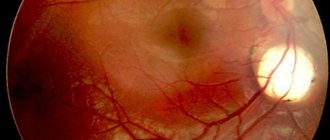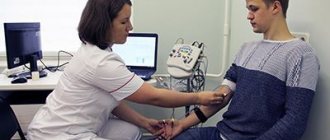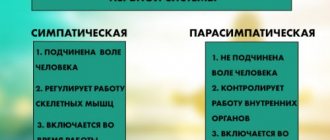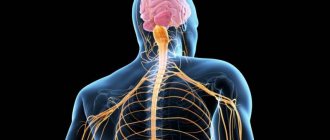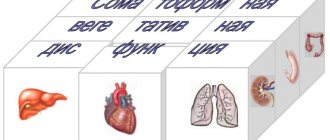Why does the body need B vitamins?
Our central nervous system, and especially its leader, the brain, simply requires sufficiently large amounts of energy for productive work.
B vitamins are involved in the synthesis of energy for the central nervous system. They are also noticed in close connections with the circulatory and cardiovascular system; without them, it also begins to “slow down”. Of course, not all B vitamins immediately perform the designated roles; each vitamin has its own “role,” and we will also talk about this in detail. But how do you know if you are lacking B vitamins? You may notice a lack of energy, irritability, a tendency to tantrums, a basic decrease in mood, and even suspect that you are depressed. If the cause is B deficiency, the symptoms will most likely be supplemented by insomnia and loss of “former beauty” (brittle hair and nails, deterioration of skin quality).
B vitamins
Let's look at the unique roles of the seven vitamins:
B1 (thiamine)
Plays an important role in metabolism, helping to convert nutrients into energy, normalizes the condition of the cardiovascular and endocrine systems. Necessary for the protection of nerve cell membranes, transmission of nerve impulses and nutrition of the brain.
The richest food sources include pork, sunflower seeds and wheat germ.
B2 (riboflavin)
Helps convert food into energy and also acts as an antioxidant. Increases the level of hemoglobin in the blood, stimulates hematopoiesis. Improves the general condition of the nervous system.
Foods highest in riboflavin include organ meats, beef and mushrooms.
B3 (niacin, vitamin PP)
Plays a role in transmitting signals from cell to cell, normalizes inhibitory processes in the central nervous system, prevents the occurrence of neuroses and hysteria. Participates in metabolism, production and repair of DNA. It is also critically important for metabolic processes in the heart muscle, good blood circulation and normal blood clotting.
Food sources: chicken, tuna, lentils.
B5 (pantothenic acid)
Like other B vitamins, pantothenic acid helps the body obtain energy from food, and is also involved in the production of hormones, cholesterol and tissue regeneration. In the nervous system it is responsible for “feelings”, as it plays a role in the synthesis of acetylcholine, the most important substance for the transmission of nerve impulses in the central nervous system to the parasympathetic nervous system.
Liver, fish, yogurt and avocados are rich in pantothenic acid, but cooking them significantly reduces the dose.
B6 (pyridoxine)
Participates in the metabolism of amino acids, the production of red blood cells, and has a beneficial effect on the condition of blood vessels. In the nervous system, it plays a role in the creation of neurotransmitters (substances through which electrical impulses are transmitted in nerve cells). It is also responsible for the uptake of glucose by neurons and the absorption of magnesium, which ensures the transmission of nerve impulses. Pyridoxine also helps improve memory and mood, as it participates in the synthesis of serotonin.
Foods with the highest content: chickpeas, salmon and potatoes.
B9 (folic acid)
Necessary for cell growth and proper division, amino acid metabolism, formation of red and white blood cells, and prevention of anemia. In the nervous system, it is responsible for the synthesis of glycine, which has anti-stress and nootropic effects and regulates inhibition processes.
Can be obtained from leafy greens, liver and legumes.
B12 (cobalamin)
Perhaps the best known of all the B vitamins, it is vital for neurological function. Affects the formation of the sheath of nerve fibers (myelin), which protects nerve cells from destruction and strengthens the nervous system. Involved in the production of DNA and red blood cells. Improves muscle function, including the heart.
Contained in foods of animal origin: meat, eggs, seafood and dairy products.
Evgenia Shikh: “B vitamins help to better withstand mental stress”
Huseyn Farajov:
– Hello, the program “About health and not only with Dr. Farajov” is on air. I'm Huseyn Farajov. Today we will talk about vitamins and microelements. We have a very interesting guest in our studio, a scientist who has an impeccable reputation in the scientific world in matters of vitamins and pharmacology. We always look forward to Evgenia Valerievna Shikh’s speeches; for us, she is the standard of scientifically proven and correct modern approaches to any issue, especially vitamins. So, Evgenia Valerievna Shikh is a doctor of medical sciences, professor, head of the department of clinical pharmacology and propaedeutics of internal diseases at Sechenov University, director of the Institute of Professional Education at Sechenov University. We all take vitamins now, but I am concerned about another issue: there are too many people who talk about these vitamins and microelements, and this is not always scientifically substantiated, and society has a very light attitude towards them. Are we overly enthusiastic about supplements, vitamins, microelements, and what are vitamins?
Evgenia Shikh:
– Vitamins are substances that are not synthesized in the body or are synthesized in extremely small quantities, but are responsible for a large number of vital reactions. Nothing is built from the vitamins themselves in the body, but they themselves participate in many important reactions. B vitamins are responsible for energy supply to the body, other micronutrients for other functions. Many people are passionate about vitamins, and there was a period in our lives when people didn’t really care about their health, and the medical community, among other things, set itself the goal of drawing people’s attention to a healthy lifestyle, and then we talked a lot about You need to take vitamins and vitamin supplements. We did not differentiate them then, that some micronutrients can prevent certain diseases, and other micronutrients can prevent other diseases. And now we have already entered another stage, we understand that the body needs all vitamins and micronutrients, but there are conditions in which the body needs a certain group of vitamins. Can be divided by registration status. There are dietary supplements, no one said that this is bad, this is a special registration status and it contains vitamins, macro- and micronutrients at the level of nutritional or physiological daily requirements, that is, this is what a person lacks in nutrition. There is another registration status - a medicinal product, and this already contains higher doses, and they may contain therapeutic doses of vitamins. And there is no need to confuse these two directions. There is a preventive direction, where there are enough dietary supplements, where the doses are low, and there are vitamin-mineral complexes that contain vitamins in higher dosages, and they have medicinal use. Vitamins are not that simple. When I started my scientific career, I was faced with the question of what topic to write my doctoral dissertation on, my teacher, Academician Kukis, said: “You will write about the clinical pharmacology of vitamins.” Apparently, he didn’t really like the expression on my face, because I was upset, it seemed to me that I was such a serious specialist, I wanted to write about acute coronary syndromes, something so unusual, and he told me: “Mark my words, that time will pass, and there will be only a few such specialists, because it is the clinical pharmacology of vitamins that requires deep study in order to understand what doses, what regimens, what indications, contraindications.”
Huseyn Farajov:
– We are faced with the fact that very often patients are prescribed a huge number of tests, including for many vitamins. Is it necessary for a patient without any specific symptoms to determine all the vitamins in the blood?
Evgenia Shikh:
– It depends on what the goal is being pursued. We determine the level of vitamins in the blood plasma in exceptional cases, if we suspect some kind of severe hypovitaminosis, if this is necessary in order to prescribe high doses. Let's look at the situation that is currently happening with vitamin D. There is a pandemic in the world of insufficient supply of vitamin D, but on the other hand, there is no point in determining the level of vitamin D left and right, spending the finances of our patients on this in such a difficult time, because if we We will take the vitamin in a dose at the level of the daily nutritional requirement, that is, prophylactic doses, this is the majority of drugs on the territory of the Russian Federation. To do this, you do not need to determine your vitamin D level. On the other hand, there are special recommendations from the endocrinology center and it clearly states that screening for vitamin D levels is indicated only for certain categories of patients. These are patients who suffer from severe resorptive bone diseases, these are all patients with symptoms of malabsorption, who have impaired absorption or who have undergone surgery after diseases of the gastrointestinal tract, that is, this is a clearly limited category of patients. Women in prenatal preparation. If everything is fine with a woman, it is enough for her to take vitamin D at the level of daily nutritional requirements. If she has problems with fertility, that is, she has infertility and she goes for this examination, then the level of vitamin D in the blood plasma can be determined, because there are such interesting works that say that fertility increases when there is a good level of vitamin D, a significantly higher percentage of successful outcomes when performing assisted reproductive technologies, that is, IVF, ICSI.
Huseyn Farajov:
– 2000 international units is the daily requirement for vitamin D. When a patient comes to you without a test, how much do you prescribe?
Evgenia Shikh:
– I prefer a dose of 1000 if this is a patient without analysis, without obvious problems associated with vitamin D. On the territory of the Russian Federation, the standards set by the Institute of Nutrition are still in force, and these are 200 international units. According to our regulatory approaches, we can prescribe vitamins in a daily dose of 200%, that is, this is already 400 international units, and a dose of 1000 is allowed for us, and 2000 is the maximum allowable dose at the level of daily nutritional needs. Everyone says that you need 3000, 4000, 10,000 - in fact, we don’t have enough studies that would talk about what dose can be prescribed, what period of time should be taken in order to eliminate the deficiency, we don’t know that. Now, in connection with the situation with COVID, very interesting foreign publications have appeared that study the association of vitamin D levels with the severity of the disease. There are studies published in Thailand that show that those who have a sufficient supply of vitamin D are sick in a milder form, that is, they have mild to moderate severity of the disease, and vice versa, insufficient supply is associated with a severe course of COVID. One of the foreign articles suggests that now it is imperative to pay attention to the supply of vitamin D, they propose to raise the level, if we considered the supply to be more than 30 nanograms per milliliter, then they now propose to raise it to 40, and they recommend a dosage of 10,000 international units for 5 days , and then we move on to maintenance doses. But again, the recommendation is speculative. There must be studies of pharmacokinetic parameters, we must look at the concentration in order to develop such a dosage. According to current clinical recommendations in the Russian Federation, we cannot prescribe more than 10,000 international units without regular laboratory monitoring of blood plasma. There is another regulatory approach; we can prescribe therapeutic doses, that is, more than 2000, only to those who have laboratory-confirmed low levels of vitamin D.
Huseyn Farajov:
– A patient comes, we prescribe 1000 or 2000, he takes it, gets tested, and the low level of vitamin D remains. Is it worth looking at vitamin D at the first appointment and a little more, for example, 10,000 for 5 days or 10 days and then reduce the dose, suddenly We prescribe a small dose and do not achieve results?
Evgenia Shikh:
– Vitamin D still does not allow extreme conditions and there is no point in striving for a minimum period of time to achieve this high concentration. I am against high doses, because this substance is fat-soluble and has undesirable effects, including an overdose due to the fact that it is removed from the blood plasma rather slowly, and side effects can manifest as increased blood pressure and headaches. I wouldn’t risk it, this is not a drug for solving emergency situations. We should prescribe a dose of 1000, 2000, 3000 to the patient for 6-8 weeks, and only after that we cannot count on an earlier restoration of vitamin D levels. And I also ask you to pay attention to two aspects. Firstly, we have active metabolites of vitamin D - these are 25 OH, dihydroxy, and so on, and we determine a completely different form of vitamin D in the blood plasma, because this form is a transport one, and by this transport form we judge the body’s supply of vitamins . There are more active forms of vitamin D in the body, we do not determine them, so this indicator is quite indirect. We have a number of drugs that cause iatrogenic vitamin D deficiency, and here we definitely need to provide subsidies. These are antiepileptic drugs, not all, but the vast majority, H2 histamine blockers, anti-tuberculosis drugs, all of this requires additional vitamin D supplementation. Some patients ask the question: the doctor recommended taking 10,000-15,000 times a week, but you need to understand that on the territory of the Russian Federation There are no such special dosage forms of sustained release of vitamin D registered, and if we take the usual dosage form at such a dose, we will first have a large peak, a rise in concentration, then a drop and a residual concentration. Our goal is to ensure that the supply in the blood plasma is approximately the same at the level of daily nutritional requirements throughout the day. Therefore, we need a regular supply of food in the body, and in this way we will make up for the defect.
Huseyn Farajov:
This question always causes a discussion - is it necessary to add vitamin K to vitamin D or is it not necessary?
Evgenia Shikh:
– It depends on what goal we are pursuing. If we take vitamin D and normalize fertility issues, then it is not necessary. If we are preventing various osteoporotic conditions, then it is advisable to prescribe vitamin K. I believe that vitamin K is completely undeservedly forgotten and is not as advertised as vitamin D. What does vitamin K do, in simple words? It contributes to the fact that osteoclasts are special cells, they are located in the bone in accordance with the architectonics of the bone, that is, this significantly strengthens the strength of the bone. And if we prescribe in this regard (prevention of senile osteoporosis, menopausal osteoporosis, bone tissue damage), then it is advisable to combine it with vitamin K.
Huseyn Farajov:
– We started talking about Covid, and the Americans in their studies still recommend taking zinc, and now in many pharmacies zinc is even missing. Tell us about this element.
Evgenia Shikh:
Zinc is one of the micronutrients that most strongly stimulates the immune system, it affects the thymus gland and changes the concentration of thymulin. Repeatedly, even in our country, attempts have been made to register drugs that contain zinc with other components, and vitamin A is a synergist, for the prevention of acute respiratory viral diseases. But proving prevention is quite difficult. But in European countries such supplements exist and it is believed that zinc can prevent the incidence of acute respiratory viral infections. In general, the micronutrients that most affect the immune system are ascorbic acid, vitamin D, A, zinc, and definitely selenium. We have special methodological recommendations that were approved by the chief physician on April 14, just when self-isolation began in our country, this is nutrition in conditions of covid infection, and for the first time in the methodological recommendations it appeared that absolutely all categories of the population are recommended to take dietary supplements. And precisely these micronutrients, which affect nonspecific immunity, were listed as components that should be included in dietary supplements. Regarding zinc, there is experimental data that shows that it reduces the ability of the virus to replicate, it affects thymulin and the production of interferon. But there is not enough evidence that this is a drug and that 100% people can count on it. And vitamins are not a panacea, this is our minimum chance to try to maintain our health using minimally invasive methods in order to withstand an extreme situation, but to say that I take vitamins, I have good immunity and I will not get sick, is not unequivocal. Now there is a very interesting publication that shows that almost all obese people have hypovitaminosis.
Huseyn Farajov:
– There are people who live far from Moscow, they don’t get tested for vitamin D, but they can buy it, they heard it somewhere, and no one tells the dosage. Now everyone has decided that they need to take zinc. What dosage is safe for the average person?
Evgenia Shikh:
“I’ll tell the average person this: you want to buy something, pick up the package, read it carefully, and it will definitely indicate the content of the components, for example, zinc as a percentage of the daily requirement. And you don’t need to know how much it is, 7 mg, 5 mg, before you buy, you need to look at the packaging and it will say what percentage of the daily value of zinc will be in one capsule that you take today. Usually it is 60, 80, 100, 120%, but no more; an ordinary person who lives far from Moscow does not need more. The markings on dietary supplements, medications, labels, packaging, everything is so well developed that if a person can read, he will read and be safe. In general, before you put anything in your mouth, you need to develop the habit of reading the ingredients of what you want to eat.
Huseyn Farajov:
“But we now live in a time where one thing may be written on the packaging, but the composition will be completely different. Therefore, we stopped trusting the inscriptions.
Evgenia Shikh:
Dietary supplements are a very good idea, but due to the fact that there is aggressive advertising, attempts to replace medications with dietary supplements, that dietary supplements help with diseases, dietary supplements do not help. Even the most active pharmacological substances in dietary supplements are contained in doses in which they cannot have a pharmacological effect, this must be remembered. Dietary supplements can be equated to medical nutrition, but not to medications. Dietary supplements can be used in the treatment of a disease, but only as prescribed by a doctor and in complex therapy with medications, that is, dietary supplements are a preventive thing, they are a dietary supplement that helps replenish the necessary micronutrients and make the composition of the diet optimal. And unscrupulous manufacturers advertise some properties, and lay out others, but let's think about the good, after all, we have bodies that regulate the circulation of dietary supplements, they exercise good control, and it seems to me that if you buy in pharmacies, you will not I am against shopping on the Internet, I am for buying in pharmacies in trusted places where you can see documents confirming quality, this is also an opportunity to protect yourself. Many questions arise, but these are not only questions of the individual, these are questions of the state. The state is trying to create regulatory documents in such a way as to fulfill this function; control bodies monitor this, and they work actively. But there are unscrupulous people everywhere.
Huseyn Farajov:
– You mentioned vitamin C, and now there is also a certain craze for large doses of vitamin C.
Evgenia Shikh:
– Ascorbic acid has long attracted the attention of people and specialists; the Nobel Prize was once awarded for the use of ascorbic acid in the treatment of influenza. After this, a fairly large number of evidence-based studies were conducted that did not confirm that ascorbic acid can significantly influence the incidence of influenza, the duration of the disease, but it has certain positive properties, it increases exercise tolerance, reduces the replication of viruses, and in combination she is very helpful. Ascorbic acid more than 300-400 mg is not absorbed, the use of high doses of ascorbic acid, 500 and 1000, if it is ascorbic acid, then this can be dangerous from the point of view of irritating effects on the gastrointestinal tract, kidney stone formation. But by vitamin C we can understand not only ascorbic acid, there is a compound that is ascorbate, this also applies to ascorbic acid, and this compound has great advantages, it has a neutral pH, so it does not cause pain in the gastrointestinal tract, stone formation, is retained in the body longer, this is important for ascorbic acid, because a deficiency of ascorbic acid can be eliminated very quickly - you ate a few oranges, and you have a good concentration, but it is not retained in the body for long, it has a very short half-life, and ascorbate is more lingers in the body for a long time, and this is also a form of vitamin C. It can already be used in higher doses, 500 or 1000 if necessary. There is a rare situation when it is necessary to use very high doses of ascorbic acid. Now we can go back to Covid again. These detoxification schemes are used using parenteral administration of ascorbic acid, these schemes are used in America, now in China a very large study has been launched on the use of parenteral ascorbic acid for detoxification, it has not yet ended, they are talking about large doses, from 15 to 30 g per day. day. We also have a coronavirus hospital at Sechenov University, and ascorbic acid is also used in detoxification topics.
Huseyn Farajov:
– In the form of tablets, how long can a person safely take it, because I know people who take vitamin C month after month?
Evgenia Shikh:
– Such a classic recommendation for taking vitamins is the following: this is 2-3 months, then a 2-3 week break and another 2-3 months, but it is recommended to change vitamin-mineral complexes, you don’t take the same one all your life, they can be changed according to composition, you can change the manufacturer.
Huseyn Farajov: – How do you feel about multivitamins? To what extent do they exist and how effective and safe are they?
Evgenia Shikh: – If we are talking about prevention, then absolutely complex drugs have a place. If we are talking about the treatment of an identified deficiency of a clinically significant vitamin, then we need to give preference to a single drug, and this approach is traditional, it must be followed. Nowadays, technologies for the production of vitamin-mineral complexes have stepped far forward. And microgranulation, microencapsulation technologies prevent these interactions that we used to be afraid of, these interactions mainly occur at the storage stage. And if we use it for the purpose of prevention, then there will be no pronounced malabsorption, you can absolutely safely take complex drugs, but I won’t really like it if there are 100 components, 50 components. Today we only have 13 vitamins, the rest are vitamin-like substances, useful micronutrients, but we only have 13 vitamins.
Huseyn Farajov:
Taking B vitamins is now popular. How important and necessary are they?
Evgenia Shikh:
– These are basic vitamins, they provide all the processes of energy supply to the body, without B vitamins there is absolutely no place. This includes thiamine, riboflavin, and pyridoxine. A B vitamin such as B12 cyanocobalamin is a substance that has extremely low bioavailability, so it is most difficult to adjust its concentration in the blood plasma. B vitamins are very important for conduction along nerve fibers, so if a person has any disease, for example, type 2 diabetes mellitus or diseases associated with visual impairment, it is necessary to take B vitamins to prevent the occurrence, development and progression of polyneuropathy, because usually our patients catch it very late, when the polyneuropathy progresses, when there is already pain, it is very difficult to do anything in this situation. The main task is prevention, it is easier. Here, B vitamins are absolutely irreplaceable. B vitamins are very important for cognitive function. If a person has intense mental stress, stress, or a lot of work, then B vitamins are those vitamins that promote concentration and help a person withstand more mental stress. Patients who have behavioral abnormalities, are impulsive, are not very adequate, and in psychiatric practice, B vitamins are used very often as part of complex therapy. And every older person who has back pain, leg pain, or severe pain syndrome is prescribed B vitamins along with non-steroidal anti-inflammatory drugs, because they enhance the effect of non-steroidal anti-inflammatory drugs by influencing their metabolism, and B vitamins have its own antinociceptive effect, this is an analgesic effect at the level of the cerebral cortex. This combination began to be used many years ago, and then they found scientific confirmation why non-steroidal anti-inflammatory drugs provide better pain relief with B vitamins, because B vitamins slow down their metabolism and have a higher concentration in the blood plasma. In neurology, B vitamins are very often used. B vitamins are also used for hypercysteinemia, but these are large doses, medicinal, also in preparation for transplantation, but this is a purely medical use.
Huseyn Farajov:
– I can’t help but ask about calcium. How reasonable is calcium supplementation in old age?
Evgenia Shikh:
– Calcium at the level of daily nutritional requirements, in combination with vitamin D, K to prevent bone damage, because with age the bones become brittle, brittle, we are afraid of falls and fractures in elderly patients, but this is prevention. And not only in elderly patients. There was a very interesting study: despite the fact that children take a large amount of dairy products - cottage cheese, kefir, milk - the supply of calcium is still low, and calcium forms the skeleton, the human skeleton, so taking calcium at the level of daily needs is recommended. But calcium is an interesting substance, it interacts with iron and zinc, so in order to take it for benefit and not uselessly, if a person takes iron supplements, then it needs to be diluted over time.
– Huseyn Farajov:
– Let’s end the program with your wishes.
Evgenia Shikh:
– I wish everyone good health and not to get sick. And in addition to such restrictive measures as self-isolation, social distancing, wearing masks, there is also the world of public health, when every person must monitor their health, they need to play sports, take micronutrients, among other things, which will help increase the body’s defenses. And I wish everyone health, health and once again health, and, of course, a happy holiday, but so that the holiday does not spoil your health.
Huseyn Farajov:
- Be healthy, see you later.
Link to publication: doctor.ru





